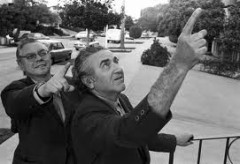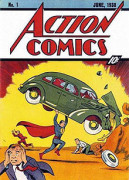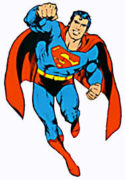He rocketed to earth from a dying planet and grew up with supernatural powers. Faster than a speeding bullet, he masqueraded as a mild-mannered newspaper reporter named Clark Kent. When called upon to perform a good deed or save the planet from nefarious enemies, he changed into the Man of Steel, wearing a blue costume emblazoned with a stylized red and yellow shield and a red, flowing cape.
He was Superman, the ultimate hero, an American cultural icon whose incredible feats of derring-do lay beyond the capacity of mere normal human beings.
As a young man, I was addicted to Superman comics, looking forward to each successive issue. I was utterly desolate when I learned that my father, in one of his house-keeping routines, had thrown out my collection of Superman comics, which would have been worth a tidy sum today.
Superman was the creation of two Jewish boys from Cleveland, Jerry Siegel (1914-1996) and Joe Shuster (1914-1992). The sons of Eastern European immigrants, they formed a formidable team, with Siegel dreaming up the story and Shuster drawing the cartoon.

They are the subjects of Brad Ricca’s biography, Super Boys, published by St. Martin’s Press. A resident of Cleveland himself, Ricca has written a fast-flowing book brimming with details large and small. It’ ll probably be regarded as the definitive work on the topic.
Shuster, born in Toronto, thrived on the comic book page of the local daily, The Toronto Star. His best friend and cousin, Frank, would constitute half of the famous Canadian comedy team Wayne and Shuster. When he was 10, he and his family moved to Cleveland. His mother hoped he would be a doctor, but he was drawn to art, teaching himself to draw by tracing funnies in the paper. Shuster’s cousin, Siegel, was an avid reader, an aspiring writer and science fiction fanatic. By all accounts, their mutual attraction to pulp magazines cemented their friendship.
As high school students, Shuster and Siegel produced their earliest comics, but their first published collaboration was Henri Duval, which appeared in New Fun Comics in 1935. In Ricca’s estimation, Duval was “a Three Muskateers rip-off and was all about horses, cavaliers and pretty ladies in pretty dresses wailing to be rescued.”
Siegel’s conception of Superman turned on a character with “infinite strength” who intimidated people. “He’s different and sure to become the idol of young and old,” he wrote in his proposal. “He’ll single-handed rescue a town from a flood through his super-strength.”
Siegel was confident that the comic book industry would “turn cartwheels and come rushing to our doorsteps, pressing Cadillacs, mansions and oodles of money on us.” But he was to disappointed. Superman needed to be refined, suggests Ricca.
Legend has it that their submission languished on an editor’s desk for months before it was finally discovered. The reality is that various comic book publishers had expressed varying levels of interest in it but had not purchased it because the science fiction field was already so crowded.
Ricca proffers another explanation why the boys had to wait so long until Superman was finally bought. Siegel and Shuster were holding out for a newspaper strip until they realized they would be better off with a stand-alone comic book.

Action Comics purchased Superman in the winter of 1938, but only after Siegel and Shuster signed their rights away in exchange for $130 and a 10-year contract.
They would deeply regret this contract.
In the last two decades of his life, Shuster had to work as a cashier and even as a stock boy to make ends meet. By the mid-1950s, he was so broke that he had to sell his furniture. Siegel fared no better, having to take a job as a typist and mail sorter. At one point, he was, as he later admitted, “close to suicide.”
Long before they reached these depths, the pair launched a lawsuit to reclaim the copyright to Superman. It was a protracted process and years elapsed before the comic book company settled the claim.
In 1975, they received word that they would each receive $30,000 per annum for the rest of their lives, and that these payments would be diverted to their families after their respective deaths.
The settlement, at best, fell far short of meeting the test of generosity.
Superman and its offshoots, Superboy, Lois Lane and Jimmy Olsen, were immensely profitable, as were a 1940s radio serial, a 1950s TV series and a string of Hollywood movies starring Christopher Reeves as Superman.
Siegel and Shuster, however, could rest on their laurels, having created one of the most memorable fictional figures in American lore. Super Boys distills the essence of their bumpy journey to pop immortality.

